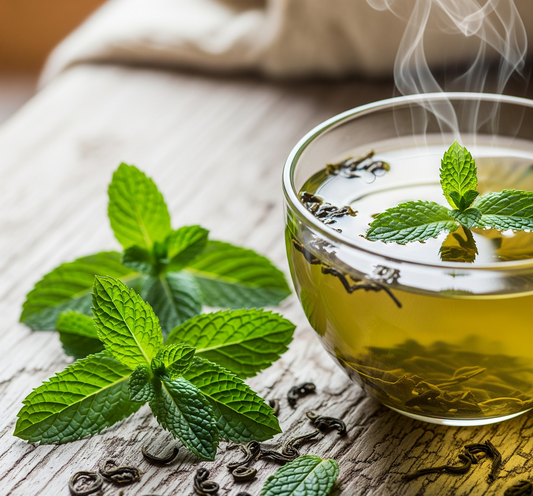"Does tea expire?" Technically, tea does not expire, but it can lose flavor and nutritional value over time, especially within 6-8 months for green tea. While expired tea is still safe to drink, proper storage is essential to maintain its quality, and there are creative ways to repurpose expired tea bags for uses like soothing tired eyes or fertilizing plants.
Tea is a popular beverage consumed all over the world for its unique taste and several health benefits. However, this begs the question, "does tea expire?" and if it does, then when does tea expire?
Well! Just like any other food item, tea starts losing its flavor and nutritional value over time. But technically, No, tea doesn't "expire" in the traditional sense. Unlike milk or berries, it won't magically turn toxic after its printed expiration. But here's the catch: expired tea loses its magic. The vibrant aromas, the nuanced flavors, the soul-soothing warmth – they all fade with time.
In this blog, we will discuss the factors affecting tea shelf life, tips for storing tea, and what to do if your tea has expired.
Can You Drink Expired Tea?
Tea is considered to be good for two or three years, but can still be enjoyed many years after the expiry date. Greener teas tend to lose their taste fast while darker teas develop new characteristics. It is necessary to inspect the expired tea to identify the growth of bacteria or mold in your tea. As an article on drinkvisp mentions, drinking expired r outdated tea may cause health risks.
So properly storing it and routine inspection are essential to identifying whether old tea is or isn't safe to drink. So the next time you ask yourself "does tea expire?", keep in mind that while tea doesn't technically expire, different factors can influence whether the tea in your cup or pot is really good to drink.
Can Tea Bags Expire?
Tea bags don’t technically expire, but the quality of the tea within them will decrease after a while. According to a research on the National Library of Medicine, the initial levels and activities of antioxidants were largely stable for about 90 to 120 days, after which a decline began. After 180 days, the decline accelerated, and by 330 days, a reduction of 60 to 75% of the original activity was observed.

Tea is made from the leaves of specific plants, and like all biological substances, will decay after a while. However, because it’s dried, tea will last for years if it’s stored properly.
Tea bags taste best for about three to five months after the initial purchase. They will gradually decrease in strength and flavor for another year or two. In the end, it is up to you to decide how long to keep your tea bags before throwing them out.
Does Herbal Tea Expire?
Herbal tea is made from dried herbs, fruits, and flowers, and it does not expire in the same way as tea made from tea leaves. However, it can lose its flavor and aroma over time. The shelf life of herbal tea depends on the type of herb used and how it is stored. Generally, herbal tea can last for up to two years if stored properly.
If you're trying to get into herbal teas, you can pick from our range of the finest organic loose-leaf herbal teas.
Does Green Tea Expire?
As with Herbal Tea, green tea doesn’t technically expire. However, it does lose flavor and nutrients over time. Ideally, green tea is best enjoyed within 6-8 months of packaging. After that, it may taste stale, but it’s still safe to drink. To keep your green tea fresh, store it in an airtight container in a cool, dark place. Even if it’s past its prime, you can still enjoy its health benefits!
Pick from our range of the best organic green tea from Nepal Tea Collective.
How to Store Loose Leaf Tea

Proper storage is imperative to tea’s shelf life, quality, and flavor. Avoiding light, heat, moisture, odor, and air will make a huge difference in the shelf life of your loose leaf tea. Here are some best practices for storing tea:
- Store tea in a dark cabinet or completely opaque container.
- Keep delicate teas separate from strongly scented teas.
- Avoid storing tea in humid areas of your kitchen or house.
- Use opaque packaging if possible.
- Be sure your packaging is food-safe.
- A tight seal is key. If the mechanism can hold water, it can protect tea.
What to Do with Your Expired Tea Bags?

Even with stellar storage, some teas eventually lose their luster. But before you send them off to the compost bin, consider giving them a second life:
- Soothe Tired Eyes: Refrigerate expired tea bags for a few hours, then place them on your closed eyelids. The cold temperature and the natural tannins in the tea can help reduce puffiness and soothe tired eyes
- Fertilize Your Plants: As an article on TEALEAVES explains, tea leaves contain generous doses of potassium, phosphorus, nitrogen, and various other trace minerals. All these elements are soaked by your plants. By using tea leaves as fertilizer, you can give your garden a boost, without the use of harsh chemicals! Cut open the expired tea bags and sprinkle the used tea leaves around the base of your plants. As the leaves break down, they’ll release nutrients into the soil, providing your plants with a natural, slow-release fertilizer
- Create a Relaxing Bath Soak: Expired tea bags can still be used to create a relaxing and soothing bath soak. Simply run a warm bath, and toss a few expired tea bags into the water. The tea will infuse the water with its natural properties, creating a spa-like experience in your own home
- Make a DIY Air Freshener: To make a natural air freshener, place expired tea bags in a small, breathable fabric bag or sachet. Add a few drops of your favorite essential oil, and hang the sachet in your closet, car, or any area that needs a little freshening up. The tea bags will absorb unpleasant odors, while the essential oils will release a pleasant scent
- Create a DIY Compost Tea: To make a nutrient-rich compost tea, simply steep expired tea bags in a bucket of water for a few days. Then, use the resulting “tea” to water your plants. The nutrients from the expired unused tea bags will help to nourish your plants and promote healthy growth




